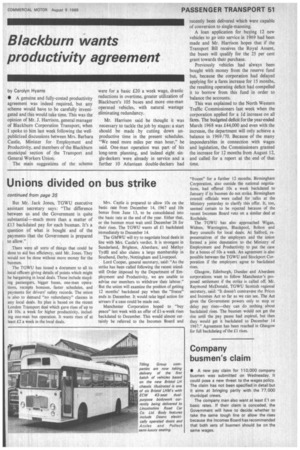Blackburn wants productivity agreement
Page 53

If you've noticed an error in this article please click here to report it so we can fix it.
by Carolyn Hyams • A genuine and fully-costed productivity agreement was indeed required, but any scheme would have to be carefully investigated and this would take time. This was the opinion of Mr. J. Harrison, general manager of Blackburn Corporation Transport, when I spoke to him last week following the wellpublicized discussions between Mrs. Barbara Castle, Minister for Employment and Productivity, and members of the Blackburn municipal section of the Transport and General Workers Union.
The main suggestions of the scheme were for a basic £20 a week wage, drastic reductions in overtime, greater utilization of Blackburn's 105 buses and more one-man operated vehicles, with natural wastage eliminating redundancy.
Mr. Harrison said he thought it was necessary to tackle the job by stages: a start should be made by cutting down unproductive time in the present schedules. "We need more miles per man hour," he said. One-man operation was part of his long-term planning, and indeed eight single-deckers were already in service and a further 10 Atlantean double-deckers had recently been delivered which were capable of conversion to single-manning.
A loan application for buying 12 new vehicles to go into service in 1969 had been made and Mr. Harrison hopes that if the Transport Bill receives the Royal Assent, the buses will qualify for the 25 per cent grant towards their purchase.
Previously vehicles had always been bought with money from the reserve fund but, because the corporation had delayed applying for a fares increase for 15 months, the resulting operating deficit had compelled it to borrow from this fund in order to balance the accounts.
This was explained to the North Western Traffic Commissioners last week when the corporation applied for a ld increase on all fares. The budgeted deficit for the year ended March 1968 was £44,000 and even with the increase, the department will only achieve a balance in 1969/70. Because of the many imponderables in connection with wages and legislation, the Commissioners granted the increase for 12 months from August 12, and called for a report at the end of that time.
















































































































































